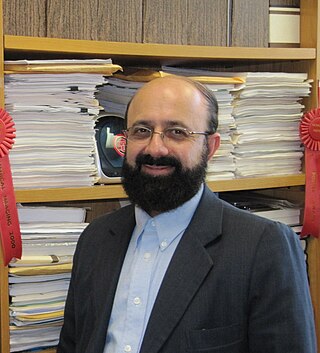Emily Mower Provost is a professor of computer science at the University of Michigan. She directs the Computational Human-Centered Artificial Intelligence (CHAI) Laboratory. [1]
Emily Mower Provost is a professor of computer science at the University of Michigan. She directs the Computational Human-Centered Artificial Intelligence (CHAI) Laboratory. [1]
Provost received her B.S. in electrical engineering (summa cum laude and with thesis honors) from Tufts University in 2004, and her M.S. and Ph.D. in electrical engineering from the University of Southern California, Los Angeles, CA in 2007 and 2010, respectively. After postdoctoral research in the Signal Analysis and Interpretation Lab at the University of Southern California, Provost joined the Computer Science and Engineering Department of the University of Michigan in 2012.
In 2016 Provost was named associate editor for ACM Transactions on Multimedia and in 2017 was named associate editor for Computer Speech and Language Journal. [2] She is on the editorial board of Affective Science, [3] an associate editor for IEEE Open Journal of Signal Processing, [4] and an associate editor for IEEE Transactions on Affective Computing since 2019. [5]
Provost directs the CHAI Laboratory [6] at University of Michigan which focuses on behavior recognition from audio-visual speech. The laboratory has two main areas of study: emotion modeling (classification and perception) and assistive technology (aphasia and bipolar disorder). In her work Provost uses machine learning and signal processing to analyze speech, in order to understand human behavior. [7] [8] Her work at the Depression Center at the University of Michigan focuses on designing technology for people with bipolar disorder. [9]

The USC Information Sciences Institute (ISI) is a component of the University of Southern California (USC) Viterbi School of Engineering, and specializes in research and development in information processing, computing, and communications technologies. It is located in Marina del Rey, California.

The USC Viterbi School of Engineering is the engineering school of the University of Southern California. It was renamed following a $52 million donation by Andrew J. Viterbi, co-founder of Qualcomm.
Computer science and engineering (CSE) is an academic program at many universities which comprises scientific and engineering aspects of computing. CSE is also a term often used in Europe to translate the name of engineering informatics academic programs. It is offered in both undergraduate as well postgraduate with specializations.

Lynn Ann Conway is an American computer scientist, electrical engineer and transgender activist.

Pramod P. Khargonekar is the Vice Chancellor for Research and Distinguished Professor of Electrical Engineering and Computer Science at the University of California, Irvine. An expert in control systems engineering, Dr. Khargonekar has served in a variety of administrative roles in academia and federal funding agencies. Most recently, he served as Assistant Director for Engineering at the National Science Foundation (2013-2016), and as Deputy Director for Technology at the Advanced Research Projects Agency – Energy. From 2001 through 2009 he was the Dean of the College of Engineering at the University of Florida.
Fawwaz T. Ulaby is Arthur F. Thurnau Professor of Electrical Engineering and Computer Science at the University of Michigan in Ann Arbor and formerly the Founding Provost and Executive Vice President of the King Abdullah University of Science and Technology (KAUST) and R. Jamieson and Betty Williams Professor of Electrical Engineering and Computer Science at the University of Michigan.

Hamid Soltanian-Zadeh is an Iranian biomedical engineer. He was born in Yazd in 1960.

Oyekunle Ayinde "Kunle" Olukotun is a British-born Nigerian computer scientist who is the Cadence Design Systems Professor of the Stanford School of Engineering, Professor of Electrical Engineering and Computer Science at Stanford University and the director of the Stanford Pervasive Parallelism Lab. Olukotun is known as the “father of the multi-core processor”, and the leader of the Stanford Hydra Chip Multiprocessor research project. Olukotun's achievements include designing the first general-purpose multi-core CPU, innovating single-chip multiprocessor and multi-threaded processor design, and pioneering multicore CPUs and GPUs, transactional memory technology and domain-specific languages programming models. Olukotun's research interests include computer architecture, parallel programming environments and scalable parallel systems, domain specific languages and high-level compilers.
Chung-Chieh Jay Kuo is a Taiwanese electrical engineer and the director of the Multimedia Communications Lab as well as distinguished professor of electrical engineering and computer science at the University of Southern California. He is a specialist in multimedia signal processing, video coding, video quality assessment, machine learning and wireless communication.

Kamal Sarabandi is an Iranian-American scientist and the Fawwaz T. Ulaby Distinguished University Professor of EECS and the Rufus S. Teesdale endowed Professor of Engineering at the University of Michigan, where he teaches and conducts research on the science and technology of microwave and millimeter wave radar remote sensing, wireless technology, electromagnetic wave propagation and scattering, metamaterials, antenna miniaturization, and nano antennas.

Shrikanth Narayanan is an Indian-American Professor at the University of Southern California. He is an interdisciplinary engineer-scientist with a focus on human-centered signal processing and machine intelligence with speech and spoken language processing at its core. A prolific award-winning researcher, educator, and inventor, with hundreds of publications and a number of acclaimed patents to his credit, he has pioneered several research areas including in computational speech science, speech and human language technologies, audio, music and multimedia engineering, human sensing and imaging technologies, emotions research and affective computing, behavioral signal processing, and computational media intelligence. His technical contributions cover a range of applications including in defense, security, health, education, media, and the arts. His contributions continue to impact numerous domains including in human health, national defense/intelligence, and the media arts including in using technologies that facilitate awareness and support of diversity and inclusion. His award-winning patents have contributed to the proliferation of speech technologies on the cloud and on mobile devices and in enabling novel emotion-aware artificial intelligence technologies.
Valeria Bertacco is a professor of Electrical Engineering and Computer Science as well as Vice Provost for Engaged Learning at the University of Michigan. She previously served as the Associate Dean for Academic Programs and Initiatives at the University of Michigan Rackham Graduate School.
Mingyan Liu is an electrical engineering and computer science professor, and the Peter and Evelyn Fuss Chair of Electrical and Computer Engineering at the University of Michigan, Ann Arbor, MI. Her research is in optimal resource allocation, sequential decision theory, incentive design, online learning, and modeling and mining of large scale Internet measurement data concerning cyber security. She was a co-founder of the cybersecurity scoring startup Quadmetrics in 2014. Quadmetrics was named a "2016 Cool Vendor in Risk Management" by Gartner, and was acquired by FICO in 2016.
Rhonda Franklin is a professor of electrical and computer engineering at the University of Minnesota. She is a microwave and radio frequency engineer whose research focuses on microelectronic mechanical structures in radio and microwave applications. She has won several awards, including the 1998 NSF Presidential Early Career Award for Scientists and Engineers, the 2013 Sara Evans Leadership Award, the 2017 John Tate Award for Excellence in Undergraduate Advising, and the 2018 Minnesota African American Heritage Calendar Award for her contributions to higher education.

Muyinatu "Bisi" A. Lediju Bell is the John C. Malone Associate Professor of Biomedical Engineering, Electrical and Computer Engineering, and Computer Science at Johns Hopkins University. She is director of the Photoacoustic and Ultrasonic Systems Engineering Laboratory.
Jason Joseph Corso is Co-Founder / CEO of the computer vision startup Voxel51 and a Professor of Robotics, Electrical Engineering and Computer Science at the University of Michigan.
Maryam M. Shanechi is an Iran-born American neuroengineer. She studies ways of decoding the brain's activity to control brain-machine interfaces. She was honored as one of MIT Technology Review's Innovators under 35 in 2014 and one of the Science News 10 scientists to watch in 2019. She is Professor and Viterbi Early Career Chair in Electrical and Computer Engineering at the Viterbi School of Engineering, and a member of the Neuroscience Graduate Program at the University of Southern California.
Mahta Moghaddam is an Iranian-American electrical and computer engineer and William M. Hogue Professor of Electrical Engineering in the Ming Hsieh Department of Electrical and Computer Engineering at the University of Southern California Viterbi School of Engineering. Moghaddam is also the president of the IEEE Antennas and Propagation Society and is known for developing sensor systems and algorithms for high-resolution characterization of the environment to quantify the effects of climate change. She also has developed innovative tools using microwave technology to visualize biological structures and target them in real-time with high-power focused microwave ablation.

Jason O. Mars is an American computer scientist, author, and entrepreneur. He is best known for his research into computer architecture and artificial intelligence, particularly in the design and deployment of conversational AI. The best-selling author of Breaking Bots: Inventing a New Voice in the AI Revolution, he has been involved in multiple AI initiatives and startups over the course of his career, including ZeroShotBot, Jaseci, Clinc, Myca, and ImpactfulAI.
Michael Zyda is an American computer scientist, video game designer, and Professor of Computer Science Practice at USC Viterbi School of Engineering, University of Southern California. He was named an IEEE Fellow in 2019 and an ACM Fellow in 2020 for his research contributions in video game design and virtual reality. He is also the founding director of the Computer Science (Games) degree programs at USC Viterbi. Michael received his bachelor's degree in bioengineering from University of California, San Diego, master's degree in computer science from University of Massachusetts Amherst and doctoral degree in computer science from Washington University.